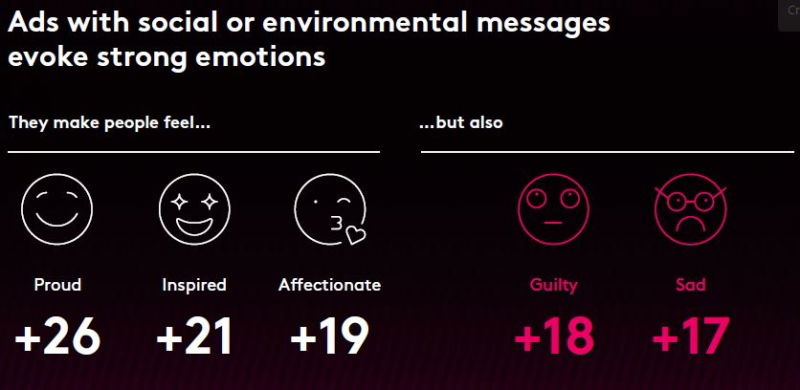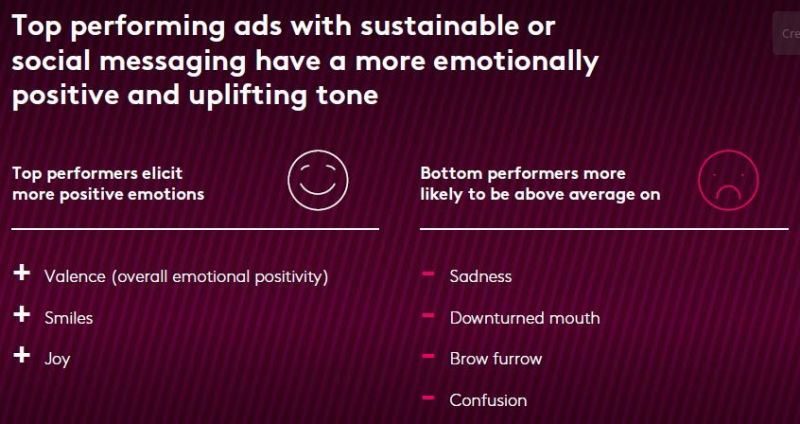
What works better in advertising: Guilt or hope?
share on
Sustainability is becoming a crucial focal point for brands these days and companies are doing their part to support the cause by pledging net-zero emissions and even moving away from plastic packaging, for example. Ads are also playing a role in driving the message of sustainability and according to a study by Kantar and Affectiva, ads with social or environmental messages make people feel proud, inspired, and affectionate. At the same time, however, these ads also made people feel guilty and sad.

Emotions can make or break such ads, Kantar said. While it is important to leverage negative emotions such as guilt, it is also important to leave consumers feeling hopeful and confident. In fact, if a character in an ad is being ridiculed for "poor behaviour", it can lead to disgust and negativity.
On the other hand, top-performing ads with sustainable or social messaging tend to positively engage viewers. Based on the study, these ads have a more emotionally positive and uplifting tone, eliciting smiles and joy. On the other hand, bottom performers were more likely to be above average on sadness, downturned mouth, brow furrow, and confusion.

Brands should not be afraid to use humour in their ads, which can lead to a much higher engagement and even educate viewers.
Humorous ads are generally more expressive (+27 points), more involving (+14) and more distinct (+11).
Citing an example of a recent Super Bowl ad by logistics firm Hellmann's, the ad showed a National Football League athlete tackling food waste by physically tackling people who are about to waste food and showing them how to avoid waste with Hellmann's mayonnaise. It also ended with a memorable line "Make taste not waste". At the same time, sustainability ads should go beyond just focusing on the actions the brand is taking. Instead, ads should also show how the brand can help consumers change their behaviour and educate them in an accessible way.
Importance of purpose and fit with the brand
Overall, sustainability is becoming a crucial element in companies' business strategies. In fact, Kantar's Link ad testing database of more than 230k ads found that the number of ads with environmental or social messaging has increased three times to 6% since 2016. However, it is not enough to talk about brand purpose and sustainability alone, in fact, the purpose also needs to fit a brand's values and be authentic to the brand.
Globally, 63% of consumers surveyed globally think brands should take the lead on sustainability issues. But 64% worry brands are involved just for commercial reasons. In an age where authenticity is valued by consumers, this is even more crucial otherwise brands might risk alienating individuals who are already sceptical of brands' actions in the sustainability space.
Kantar split over 600 purposeful ads into two groups, one where viewers say that the idea fits with the brand and one which does not. Ads with purpose and fit with the brand had a 79% impact on brand equity, sailence, immediate persuasion, enjoyment, credibility, and ease of understanding. On the other hand, ads with purpose but a weak fit with the brand only saw a 27% impact in brand power contribution.
Consumers were also segmented into four groups according to their level of engagement when it comes to sustainability ads: Actives, Believers, Considerers, and Dismissers. The reason is, not all consumers are on the same journey towards sustainable living.

This also brings about the issue of the value-action gap which is a phenomenon where people act in a way that's inconsistent with their values. Kantar's study found that 72% of respondents will choose meat over the vegetarian option because they prefer it and 70% would buy brand new things, rather than bothering with second hand. At the same time, 69% will also buy packaged products rather than bother with bringing their own refill containers to the shop.
The value-action gap is very real and Kantar listed six key barriers to sustainable consumption:
1. Convenience: 69% are in a rush when they are shopping that they don't think about it.
2. Knowledge and awareness: 58% said climate change problems are so far in the future.
3. Price and quality: 80% said when shopping, their mind is on saving money more than saving the planet.
4. Accountability: 63% don't feel like it's their responsibility to maintain sustainable consumption. Instead, it is up to businesses and producers.
5. Availability: 58% don't know where to find sustainable/ethical products.
6. Impact and fulfilment: 68% don't feel like they are making much of a difference as just one person.
Hence, it is important to understand the psychological levers that influence consumer behaviour and how brands' ads are received. Here are the five psychological levers that Kantar identified.
1. Nature connectedness: People's innate predisposition to connect and identify with the natural world.
2. Implementation intentions: A strategy in the form of an "if-then plan" that can increase the chances of goal achievement.
3. A sense of control: One of the levers of people's innate motivation for psychological growth.
4. Mitigating present bias: People's inclination to focus on the here and now and prefer immediate rewards at the expense of long-term benefits.
5. Social learning: Observing, modelling, and imitating the behaviours, attitudes, and emotional reactions of people.
MARKETING-INTERACTIVE's Content 360 is back for its 10th year! Running from 26 to 27 April 2022, the hybrid conference covers topics including the creator economy, value-based storytelling strategy, consumable content on social, as well as video and community content. Register today to learn, connect and level up with the best content marketers in Asia!
Photo courtesy: 123RF
Related articles:
Study: Singapore's SMEs need a lot more help in creating sustainable practices
Sustainable media: Govt and brands held more accountable than ad industry
P&G co-launches sustainable brand 'aio' with A.S. Watson Group
Watsons leverages online and offline network to push sustainable products
Future of the workforce: Do you have an ethical, sustainable human capital strategy in place?
share on
Free newsletter
Get the daily lowdown on Asia's top marketing stories.
We break down the big and messy topics of the day so you're updated on the most important developments in Asia's marketing development – for free.
subscribe now open in new window
